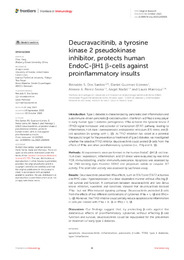Por favor, use este identificador para citar o enlazar este ítem:
https://hdl.handle.net/11000/38553Registro completo de metadatos
| Campo DC | Valor | Lengua/Idioma |
|---|---|---|
| dc.contributor.author | dos Santos, Reinaldo S. | - |
| dc.contributor.author | Guzmán Llorens, Daniel | - |
| dc.contributor.author | Perez-Serna, Atenea Alexandra | - |
| dc.contributor.author | Nadal, Angel | - |
| dc.contributor.author | Marroqui Esclapez, Laura | - |
| dc.contributor.other | Departamentos de la UMH::Fisiología | es_ES |
| dc.date.accessioned | 2025-11-27T13:24:19Z | - |
| dc.date.available | 2025-11-27T13:24:19Z | - |
| dc.date.created | 2023 | - |
| dc.identifier.citation | Frontiers in Immunology | es_ES |
| dc.identifier.issn | 1664-3224 | - |
| dc.identifier.uri | https://hdl.handle.net/11000/38553 | - |
| dc.description.abstract | Introduction: Type 1 diabetes is characterized by pancreatic islet inflammation and autoimmune-driven pancreatic β-cell destruction. Interferon-α (IFNα) is a key player in early human type 1 diabetes pathogenesis. IFNα activates the tyrosine kinase 2 (TYK2)-signal transducer and activator of transcription (STAT) pathway, leading to inflammation, HLA class I overexpression, endoplasmic reticulum (ER) stress, and β-cell apoptosis (in synergy with IL-1β). As TYK2 inhibition has raised as a potential therapeutic target for the prevention or treatment of type 1 diabetes, we investigated whether the selective TYK2 inhibitor deucravacitinib could protect β-cells from the effects of IFNα and other proinflammatory cytokines (i.e., IFNγ and IL-1β). Methods: All experiments were performed in the human EndoC-βH1 β-cell line. HLA class I expression, inflammation, and ER stress were evaluated by real-time PCR, immunoblotting, and/or immunofluorescence. Apoptosis was assessed by the DNA-binding dyes Hoechst 33342 and propidium iodide or caspase 3/7 activity. The promoter activity was assessed by luciferase assay. Results: Deucravacitinib prevented IFNα effects, such as STAT1 and STAT2 activation and MHC class I hyperexpression, in a dose-dependent manner without affecting β-cell survival and function. A comparison between deucravacitinib and two Janus kinase inhibitors, ruxolitinib and baricitinib, showed that deucravacitinib blocked IFNα- but not IFNγ-induced signaling pathway. Deucravacitinib protected β-cells from the effects of two different combinations of cytokines: IFNα + IL-1β and IFNγ + IL-1β. Moreover, this TYK2 inhibitor could partially reduce apoptosis and inflammation in cells pre-treated with IFNα + IL-1β or IFNγ + IL-1β. Discussion: Our findings suggest that, by protecting β-cells against the deleterious effects of proinflammatory cytokines without affecting β-cell function and survival, deucravacitinib could be repurposed for the prevention or treatment of early type 1 diabetes. | es_ES |
| dc.format | application/pdf | es_ES |
| dc.format.extent | 10 | es_ES |
| dc.language.iso | spa | es_ES |
| dc.publisher | Frontiers Media | es_ES |
| dc.relation.ispartofseries | 14 | es_ES |
| dc.rights | info:eu-repo/semantics/openAccess | es_ES |
| dc.rights | Attribution-NonCommercial-NoDerivatives 4.0 Internacional | * |
| dc.rights.uri | http://creativecommons.org/licenses/by-nc-nd/4.0/ | * |
| dc.subject | Apoptosis | es_ES |
| dc.subject | Deucravacitinib | es_ES |
| dc.subject | Inflammation | es_ES |
| dc.subject | Pancreatic b-cells | es_ES |
| dc.subject | TYK2 | es_ES |
| dc.subject | Type 1 diabetes | es_ES |
| dc.subject | Type I interferons | es_ES |
| dc.subject.other | CDU::6 - Ciencias aplicadas::61 - Medicina::612 - Fisiología | es_ES |
| dc.title | Deucravacitinib, a tyrosine kinase 2 pseudokinase inhibitor, protects human EndoC-βH1 β-cells against proinflammatory insults | es_ES |
| dc.type | info:eu-repo/semantics/article | es_ES |
| dc.relation.publisherversion | https://doi.org/10.3389/fimmu.2023.1263926 | es_ES |

Ver/Abrir:
7_2023_Deucravacitinib a tyrosine kinase 2 pseudokinase inhibitor protects human EndoC-betaH1_beta_cells against proinflammatory insults.pdf
2,13 MB
Adobe PDF
Compartir:
 La licencia se describe como: Atribución-NonComercial-NoDerivada 4.0 Internacional.
La licencia se describe como: Atribución-NonComercial-NoDerivada 4.0 Internacional.
.png)